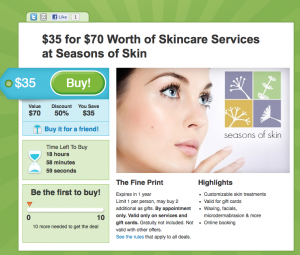Google Would Be Crazy To Spend $5B For Groupon
Google is sitting on more than $30 billion in cash so maybe $5 billion isn’t so much in that context. But it seems crazy (capital C) to me for Google to pay that kind of premium for the company — making it by far the largest acquisition in Google’s long history of acquisitions — despite […]
Google is sitting on more than $30 billion in cash so maybe $5 billion isn’t so much in that context. But it seems crazy (capital C) to me for Google to pay that kind of premium for the company — making it by far the largest acquisition in Google’s long history of acquisitions — despite Groupon’s global footprint and stellar growth.
Google could buy one or more of Groupon’s competitors (and a lot of other assets) and accomplish many of the same objectives at less cost. But what do I know?
I’m speculating that Groupon is in a position to make between $400 and $500 million in top-line revenue this year. Maybe more. But let’s assume it’s $500 million. That represents the total value of the deals that it sells. Its net is likely about half the top-line number. A $5 billion price (with or without an earnout) is about 10X revenues in my speculative scenario. That’s an ultra-super-premium.

It would get the aforementioned revenue stream, which probably is internally projected to grow (see the hockey stick in your mind) to more than $1 billion in the next couple of years. It would get an emerging global brand and a channel to sell deals (and other stuff) to local businesses and national retailers and others. It would get a local “feet on the street” sales force, though I don’t know precisely how large. And it would get a massive consumer email list numbering in the many millions.
Yes Groupon is a spectacular success right now. But just as we now see “check-in fatigue” with Foursquare et al, there is what I will call “deal fatigue” emerging. In a year or two the “deals” market will undoubtedly look quite different than it does today.
Would a Google-owned Groupon still be at the center of that evolved marketplace? Probably. But would it still be raking it in and as popular as it is today? That’s less clear.
I’m not disputing Groupon’s model or value as a general matter. What I’m arguing is that the price is too high. However if Groupon were to go public it would generate much more than $5 billion at this moment.
The model that Groupon represents — “customers not clicks” — is, in the hands of Google, potentially disruptive in the local market. Research that I’ve participated in shows that businesses are very receptive to the idea of buying customers and minimizing the risks associated with advertising, where up-front spending generates an uncertain return (i.e., clicks and even calls). Many SMBs, as a crude generalization, are skeptical of PPC for example.
Google has long been trying to crack the local ad market. It recently started selling tags with a telephone sales force. This is a further step down that perhaps inevitable path for the company. And Groupon could become a highly effective local channel that could sell a number of products, including Boost, to the local market. Google-Groupon reps could also help encourage businesses to claim their Place Pages and collect better local data at the same time. Google has invested hundreds of millions in building its own local maps data. This might be seen as part of that larger effort as well.
Yet consider that Google could buy a yellow pages publisher and its larger sales force for less than $300 million, a fraction of the cost of the rumored Groupon acquisition price. Google of course would never buy a YP publisher because of a number of issues: debt, culture clash, unwanted assets (print books). But you get the point about price.
Google could also buy one or more Groupon competitors (e.g., LivingSocial) and coupon assets (e.g., The Dealmap) for much less. But Groupon is the “brand” and the most visible and successful company in the segment. Groupon’s last funding round raised its valuation to the point where $5 billion is perhaps required to get the board to take an offer seriously. And there is a viable shot at an IPO, which would generate much more for founders and investors. So from those perspectives these numbers are not as crazy as they seem.
But were I David Lawee (VP of Corp Dev for Google) or Eric Schmidt or Patrick Pichette I would not do this deal — at this price.
Contributing authors are invited to create content for Search Engine Land and are chosen for their expertise and contribution to the search community. Our contributors work under the oversight of the editorial staff and contributions are checked for quality and relevance to our readers. The opinions they express are their own.
Related stories